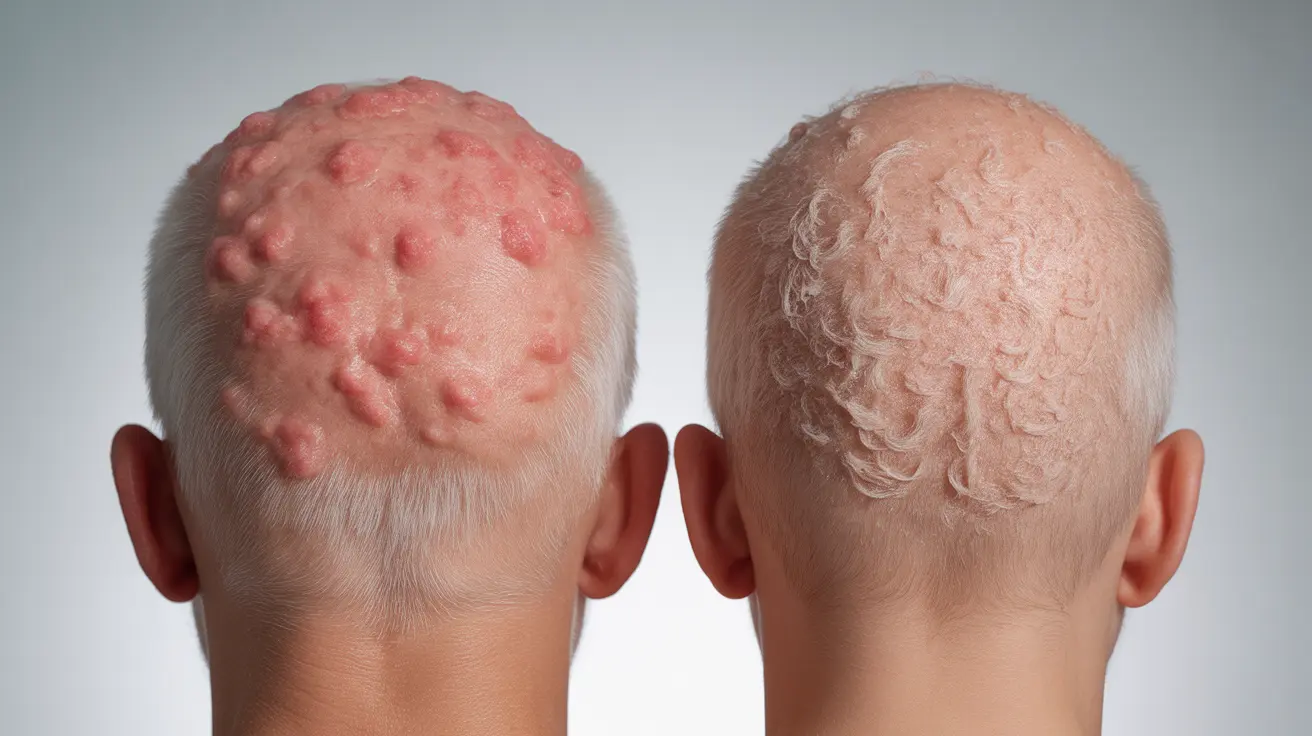When experiencing an itchy, flaky scalp, it's crucial to determine whether you're dealing with common dandruff or scalp eczema (seborrheic dermatitis). While these conditions may share some similar symptoms, they are distinct conditions requiring different approaches to treatment and management.
Understanding the differences between scalp eczema and dandruff can help you seek appropriate treatment and find relief more effectively. Let's explore the key characteristics, causes, and treatment options for both conditions.
Understanding Scalp Eczema and Dandruff: Key Differences
Scalp eczema, also known as seborrheic dermatitis, is a chronic inflammatory condition that causes red, scaly patches on the scalp. The flakes are typically yellowish or white and can be oily or greasy. The condition often causes significant inflammation, redness, and intense itching.
Dandruff, on the other hand, presents as white or grayish flakes that are typically dry and loose. While it can cause itching, the irritation is usually milder than with scalp eczema, and there's typically no visible inflammation or redness of the scalp.
Common Causes and Triggers
Underlying Factors
Both conditions are linked to the Malassezia fungus, which naturally exists on our skin. However, their development and progression differ:
- Scalp Eczema:
- Overproduction of skin oils
- Immune system responses
- Stress and hormonal changes
- Environmental factors
- Certain medical conditions
- Dandruff:
- Mild overreaction to Malassezia
- Dry skin
- Infrequent shampooing
- Product sensitivity
Treatment Approaches
Managing Scalp Eczema
Treating scalp eczema typically requires a more comprehensive approach:
- Medicated shampoos containing ketoconazole, selenium sulfide, or zinc pyrithione
- Topical anti-inflammatory treatments
- Prescription medications when necessary
- Regular scalp care routine
- Trigger identification and avoidance
Controlling Dandruff
Dandruff usually responds well to over-the-counter treatments:
- Anti-dandruff shampoos with zinc pyrithione or selenium sulfide
- Regular washing with gentle products
- Proper scalp hygiene
- Stress management
- Dietary improvements
Beyond the Scalp
A key distinction between these conditions is their ability to affect other areas of the body. Scalp eczema can appear on various body parts, particularly those rich in oil glands, such as the face, chest, and back. Dandruff, however, is strictly limited to the scalp area.
Frequently Asked Questions
1. What are the main differences between scalp eczema and dandruff in terms of symptoms and appearance? Scalp eczema presents with red, inflamed patches, yellowish or white greasy scales, and intense itching. Dandruff shows as loose, dry, white or gray flakes with mild itching and no inflammation.
2. How can you tell if your itchy scalp flakes are caused by dandruff or a more severe scalp eczema condition? Look for signs of inflammation and redness, which indicate scalp eczema. Also, consider the flake appearance: greasy, yellow scales suggest eczema, while loose, dry, white flakes point to dandruff. The intensity of itching is typically greater with scalp eczema.
3. What are the common causes and triggers of scalp eczema and dandruff, and how do they relate to the Malassezia fungus? Both conditions involve the Malassezia fungus, but scalp eczema results from a more severe inflammatory response and is influenced by factors like stress, hormones, and immune system function. Dandruff is typically a milder reaction to the fungus, often exacerbated by dry skin or infrequent washing.
4. What treatment options are effective for managing scalp eczema compared to dandruff? Scalp eczema often requires medicated treatments, including antifungal and anti-inflammatory medications, sometimes prescription-strength. Dandruff typically responds well to over-the-counter anti-dandruff shampoos and improved hair care habits.
5. Can scalp eczema affect other parts of the body besides the scalp, unlike dandruff? Yes, scalp eczema can appear on other areas rich in oil glands, including the face, chest, and back. Dandruff is exclusively a scalp condition and doesn't affect other body parts.




